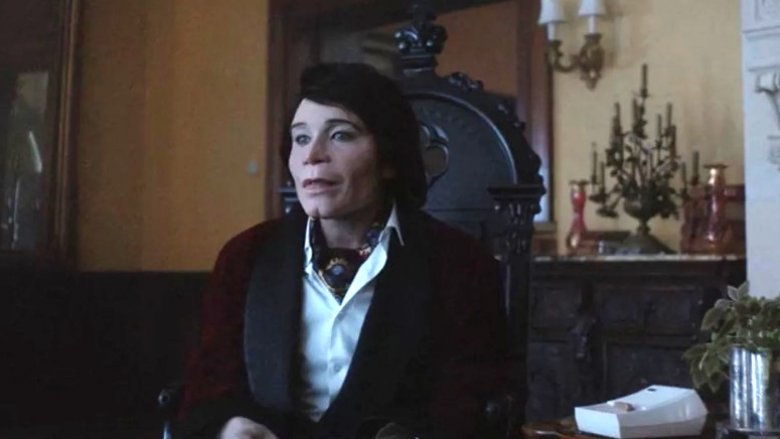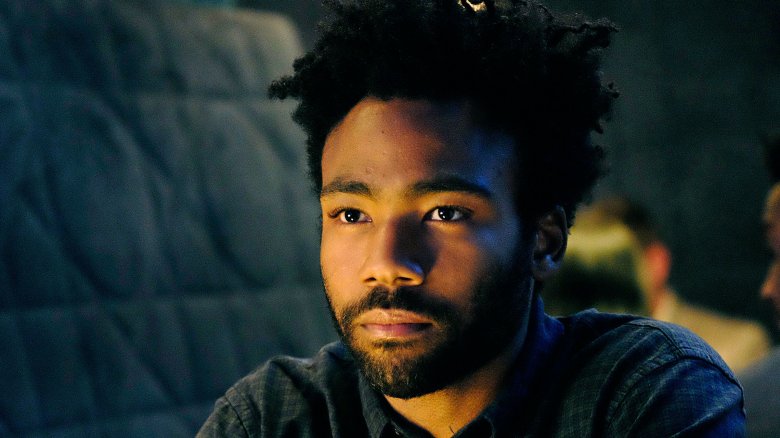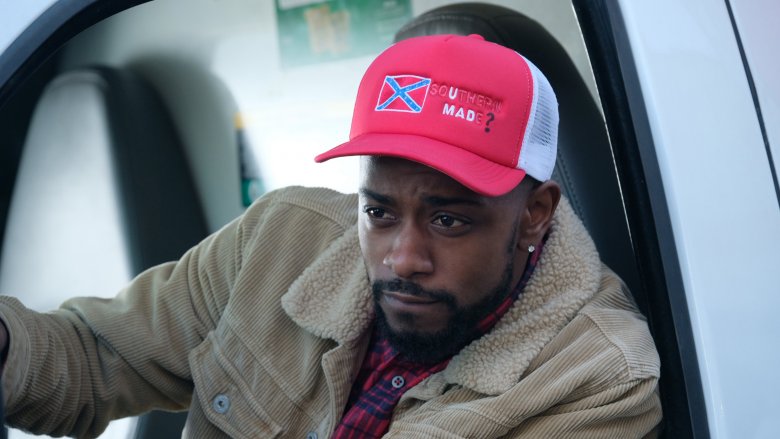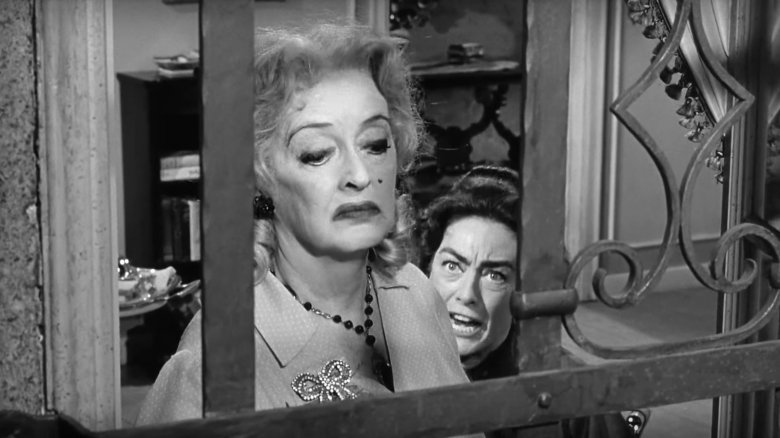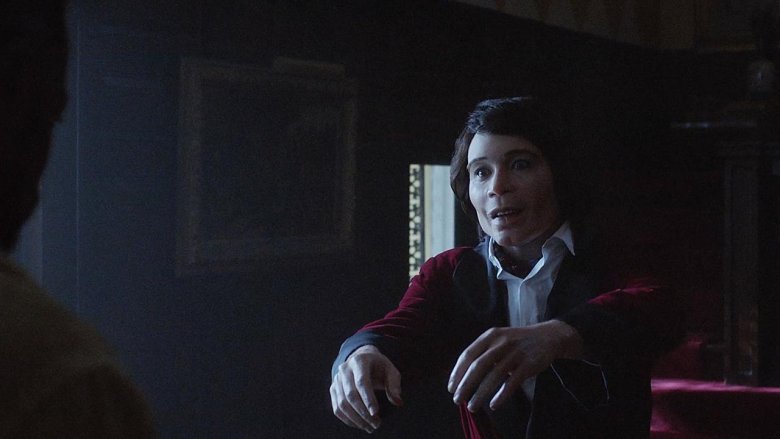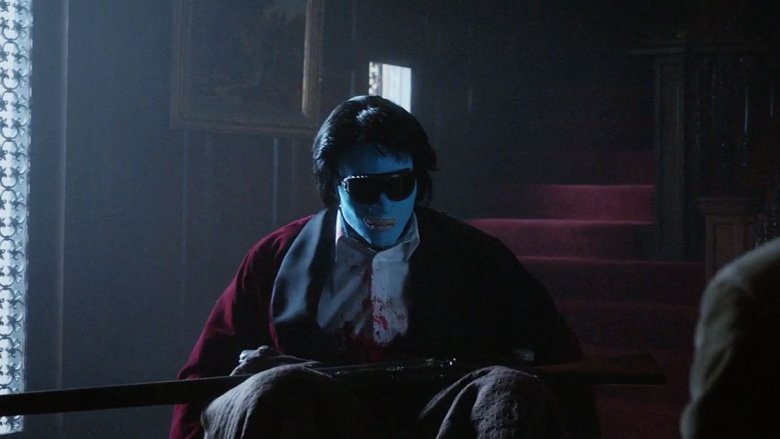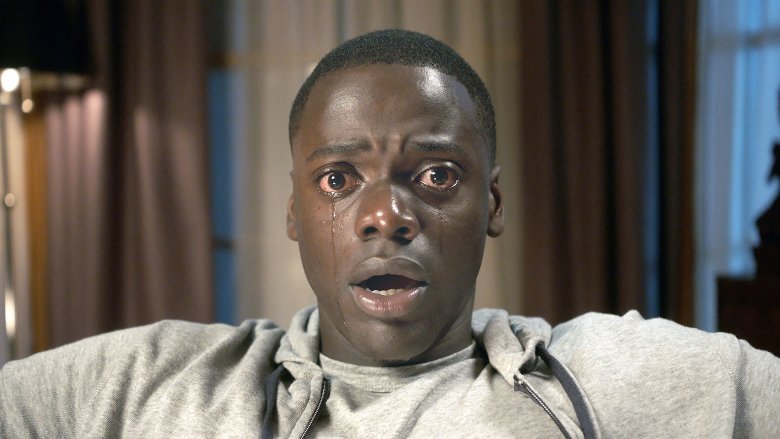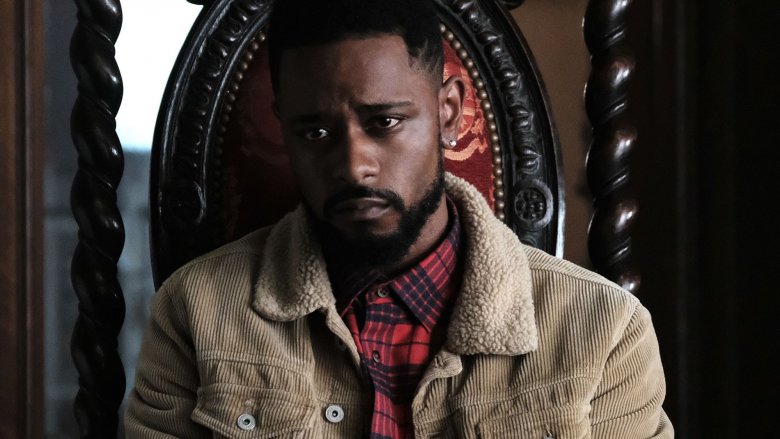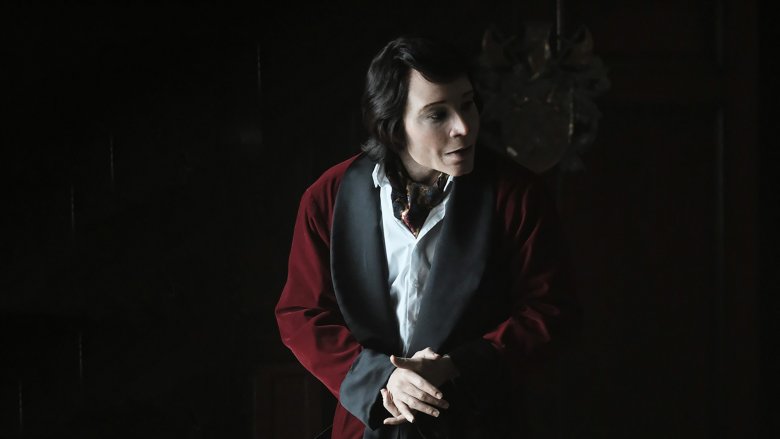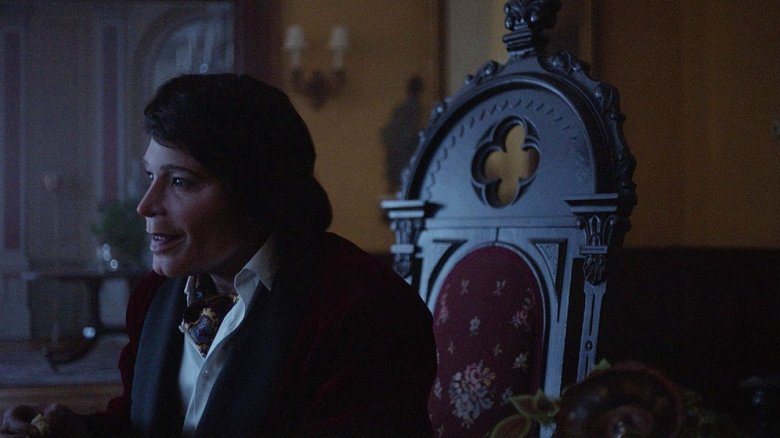The Untold Truth Of Teddy Perkins
Atlanta has been one of the most consistently surprising and engaging shows on the air since its first episode, but "Teddy Perkins," the sixth episode of the second season, managed to clear the high bar set by the rest of the series. Written by Donald Glover and directed by Hiro Murai, it's ostensibly an episode about picking up a piano that quickly morphs into a horror-tinged allegory for everything from fame to childhood trauma.
At the center of it all is Teddy Perkins himself, the ghoulish, pale recluse whose bizarre behavior anchors the episode. But who is Teddy Perkins? The episode's credits list "Teddy Perkins as himself," but it's fairly clear in interviews and even the episode itself that it's show creator and star Donald Glover underneath all that makeup. But that's not the easy answer. To make things more complicated, Teddy even showed up at the Emmys, posing for a picture with Glover. Whether you're a fan of Atlanta or just wondering what all that awards show hubbub is about, here's a look at the untold truth of Teddy Perkins.
Serial surrealism
"Teddy Perkins" might have been a standout episode in Atlanta, but it was fully in keeping with the slow, eerie surrealism established in the world of the show. Glover and his Atlanta team have never been afraid to tread toward the surreal when writing; in the world of the show, there's a fuzziness on the boundaries of reality just outside the camera frame.
In the very first episode, Earn (played by Donald Glover) runs into a bizarre man who gives him cryptic advice before trying to force him to take a bite of a Nutella sandwich and then disappearing when Earn looks away. An early joke about an NBA player pretending that he has an invisible car gets twisted when he actually runs down some people outside of a club in his invisible car by the episode's end. Justin Bieber is black. Teddy Perkins, a character who seems more a character from a deleted scene from Bram Stoker's Dracula, is perfectly in keeping with a world that exists on the periphery of realism.
All for a piano
The episode starts off like a fairly normal Atlanta episode — Darius (Lakeith Stanfield) has rented a U-Truck to pick up a free piano from a wealthy eccentric. As soon as Darius arrives at Teddy Perkins' mansion, though, the tone of the episode changes. Darius is stepping out into a horror movie, and even his wardrobe reflects that. Director Hiro Murai mentioned that he styled Darius' outfit to reflect the classic adaptation of Stephen King's Misery, and the subtextual connection to a movie about a trapped and infirm talent held hostage will definitely hold some key resonance once viewers see Benny.
Darius meets the eponymous Teddy Perkins, a Michael Jackson-esque figure who lives in a mansion supposedly supported by servants, although none of them are seen. Darius tries to indulge Teddy's odd conversational flights of fancy, even as Al and Earn encourage him to flee from a clearly twisted situation. Teddy tells Darius that his brother, Benny, was a musical prodigy, and that their father pushed them to greatness in a way that skews closer to abuse than fatherly love. Darius manages to get the piano into the elevator, but the elevator actually takes him to the cellar, where he meets the wheelchair-bound "Benny." Benny tells Darius that Teddy is planning to kill them both, but it seems like Benny is just a figment of Teddy's imagination — in another of the episode's classic horror movie references, there's shades of Psycho when this relative who may or may not exist appears. Darius is eventually held at gunpoint by Teddy and told that he's meant to be a "sacrifice." He's saved when Benny rolls into the room, kills Teddy, and then shoots himself. It's an incredibly grim ending to a horrifying episode — and Darius doesn't even get the piano.
Whatever happened to Baby Jane?
"Teddy Perkins" has a lot to say and even more movies to reference — despite focusing on Darius (usually the most light-hearted and optimistic member of the central trio), the episode is relentless in its pacing, making both Darius and the viewer feel trapped. That effect was even heightened by the original decision to air the episode without commercials. The episode is packed to the brim with plenty of moments of self-contained horror and even more overt references to classic horror movies. As far as the most obvious sources of inspiration, however, "Teddy Perkins" is most clearly referencing Whatever Happened to Baby Jane.
The 1962 film follows two sisters, one obsessed with her childhood fame as a vaudeville actor and the other left paraplegic after an accident that she blames on her sister. It's not hard to see the connections that the classic film has to "Teddy Perkins," but Atlanta personalizes it through Benny's former success as a musician. Unlike Baby Jane, which is much more focused on the older art of vaudeville, music remains a central part of Atlanta, making Benny's isolation and inability to keep making music all the more tragic. There's still an audience for Benny's talent, and his absence from the stage is far more tragic than a child vaudeville star with no one to watch her dance.
The King of Pop's pop
In terms of visual reference, Teddy Perkins is most obviously inspired by Michael Jackson. The ghoulish makeup and sharp features are impossible to look at without seeing shades of the former King of Pop. Teddy Perkins says his brother Benny developed a rare hypersensitivity to light which meant that he was unable to leave the house. Meanwhile, Teddy's bizarre features aren't explained. Michael Jackson famously claimed that he had vitiligo, which caused his skin to lose pigmentation over time (a claim that's been fiercely debated for years).
It's unclear at the beginning of the episode whether Benny actually exists, or if Teddy is simply using him to exorcise his own trauma. Once it's clear that Benny does exist, it's fitting that we don't get any explanation for why the videos of Teddy as a young child don't match his complexion as an adult. Like many people always assumed about Jackson, it could be that Teddy Perkins actively wants to look like that.
The episode goes beyond just the visual identity of Michael Jackson, though; Teddy tells Darius about his domineering father with pride in his voice, explicitly comparing him to Joe Jackson, Michael's father. Michael Jackson's brother Jermaine wrote a book largely defending the abuse they suffered at their father's hands. By combining Jermaine's defensiveness about his father with Michael's visual look, it further confuses who Teddy Perkins is and makes the twist that Benny is still alive hit even harder.
Marvin Gaye
Joe Jackson isn't the only abusive father to get a shoutout in the episode; Teddy also reference Marvin Gay Sr., the famously abusive father of Marvin Gaye. Gaye was shot to death by his father, and Teddy's reference to their relationship foreshadows the violent ending of the episode. In fact, one fan theory holds that there actually isn't a Benny, and that the wheelchair-bound figure that shoots Teddy at the end of the episode is actually Teddy's domineering father.
Either way, the reference to Marvin Gaye enriches the episode's theme of patriarchal jealousy and success. Both Michael Jackson and Marvin Gaye were pushed and abused by their fathers, and later found massive success in music; Teddy Perkins' argument is that the latter was due to the former, while Darius tries to convince him otherwise. The question of whether tragedy is necessary to make lasting art is definitely one that Atlanta reckons with; in an earlier episode, Al tells Zan that "I have to rap. I mean, that's what rap is, making the best out of a bad situation, bruh."
It's fitting, then, that Teddy Perkins tells Darius that it's a shame that "rap never grew out of its adolescence." For someone who looks at music as the epitome of pain, rather than Al's more nuanced take, rap would seem adolescent.
Horror movies galore
When Darius comes across Benny in the basement, he's covered in bandages and wearing sunglasses just like the invisible man from the 1933 horror classic. It's a bizarre look. Teddy told Darius that Benny suffers from hypersensitivity to light, but Benny's look goes far beyond just protection from the sun. He's meant to evoke the larger tone of horror that pervades the episode, while also forcing the readers to doubt whether Benny even exists — a horror that grows even larger when Benny writes out on a chalkboard that Teddy plans to kill them both.
"Teddy Perkins" doesn't just reference older horror movies, though — there's a sly reference to another Lakeith Stanfield role in the modern-day horror classic Get Out. In Get Out, Stanfield plays Logan, one of the black people subjected to mind control/body swapping who's briefly woken up by a camera flash in one of the film's most tense sequences. In "Teddy Perkins," Teddy takes Darius' photo suddenly with a bright flash.
Darius on his own
It's important that the episode focuses on Darius as the one interacting with Teddy Perkins. Teddy is obsessed with music as the culmination of the pain that his father put him and Benny through; furthermore, Teddy's combination of jealousy of Benny's talent and his role as Benny's caretaker should read familiar to fans of the show. It seems like it's meant to evoke Earn and Al's relationship to Paper Boi's success — Earn wants to capitalize off of his cousin's talent and make something that's his, while Al feels like rapping is the only thing he can do to escape his circumstances. Neither of them are entirely in control, but Darius is largely free of those headaches.
Throughout Atlanta, he doesn't seem to really worry about money the way Earn does or concern himself with music and fame the way Al does. He seems to be involved with Paper Boi because it's fun. It gives him a unique perspective to try and convince Teddy that "Not all great things come from great pain. Sometimes, it's love." It doesn't work, of course, but Darius is given a glimpse at a grim possible future for Earn and Al. The connection between Earn and Teddy is only increased when you realize that it's Donald Glover himself playing Teddy.
Teddy Perkins as... himself?
It might have taken a few viewings before you realized it, but yes, that's definitely Donald Glover playing the role of Teddy Perkins. There's a lot to infer from that decision — is Glover using Teddy to be open about his feelings regarding fame, family, and music? Is it a larger commentary on the way Glover has interrogated his own blackness over the years? The punchline of the episode is that when the credits roll, it shows that Teddy Perkins was played by himself. It almost seems to be an exact dismissal of any train of thought that tries to explicitly connect Donald Glover's role as a showrunner and actor with his performance as Teddy Perkins.
Teddy is presented as an entity singularly removed from Glover, something that remained consistent even while the episode was filming, according to Derrick Haywood, the actor who plays Benny. As Haywood recalled, "They were calling him Teddy, he acted as Teddy. There was no Donald on set whatsoever."
Still, despite the brief confusion, Teddy Perkins is definitely just a role that Glover played, right?
No, seriously, who is Teddy Perkins?
Well, not quite. Teddy Perkins actually showed up at the 2018 Emmys, even going so far as to pose for pictures with Donald Glover. What does any of this mean? Is Teddy Perkins actually a real person? Is he an allegory for the perils of black fame brought magically to life by Atlanta? Did one of the other Atlanta creatives, like Hiro Murai or Lakeith Stanfield, play him during the Emmys to give Glover a break?
It continues to be a mystery. Vulture has a rundown of every possible person that could have played Teddy on the red carpet, but ultimately they had to admit it's still unknown. When asked who it was, the cast members continually referred to Teddy as a real guy, not merely a role that Glover played. Much like the episode that he shares a name with, it seems like the mystery of Teddy Perkins eludes easy answers, and we may never know.
